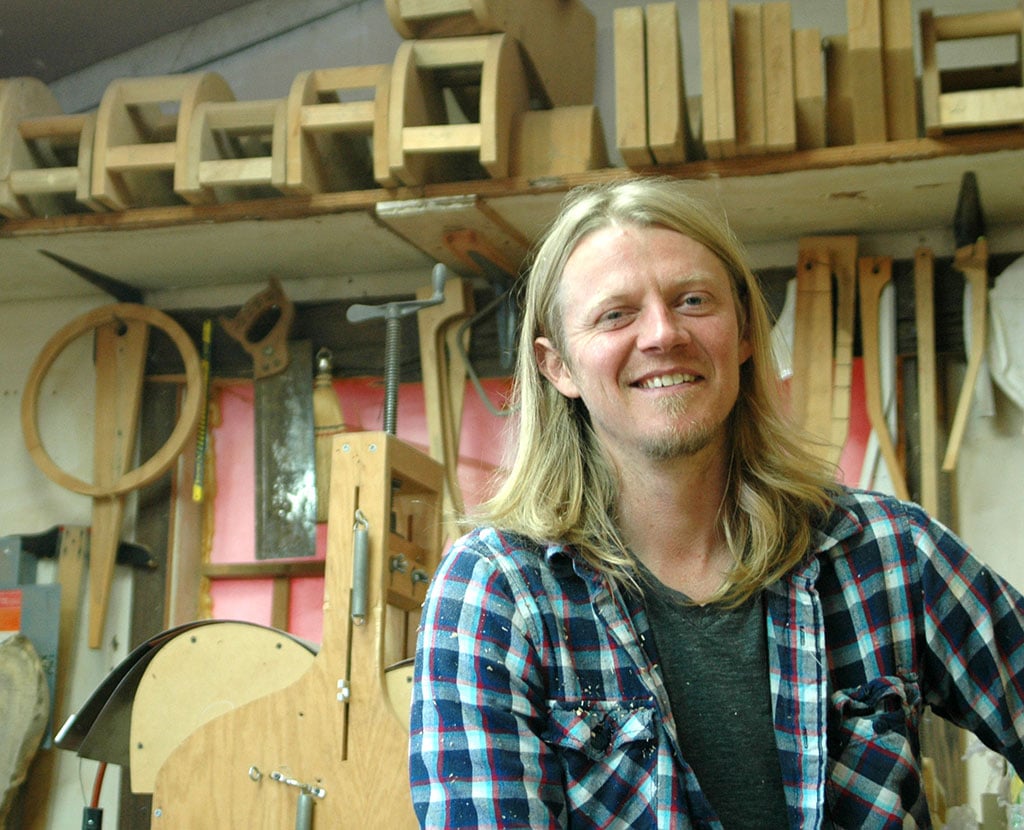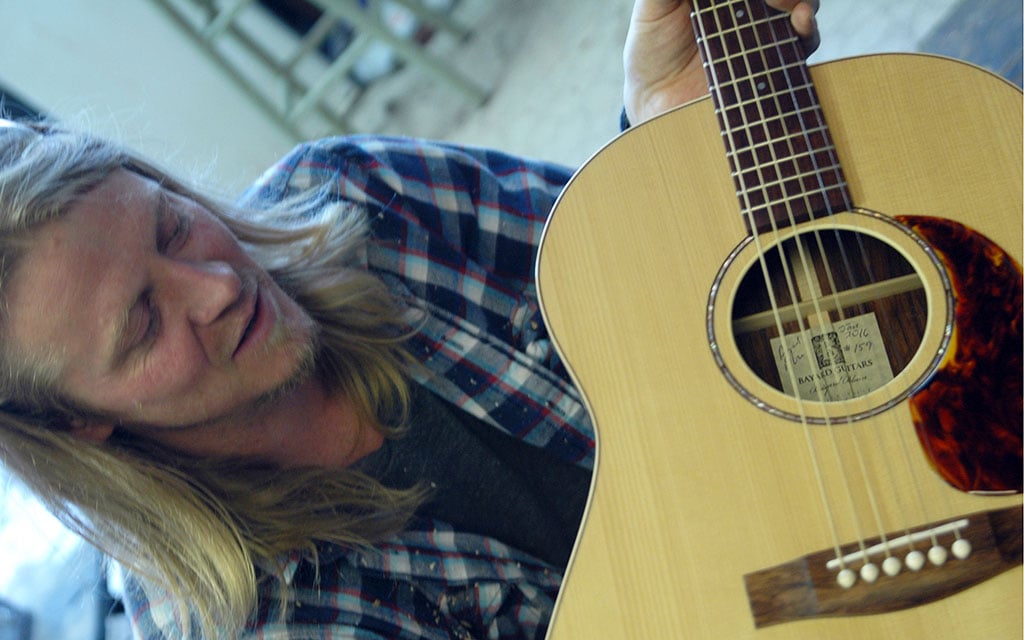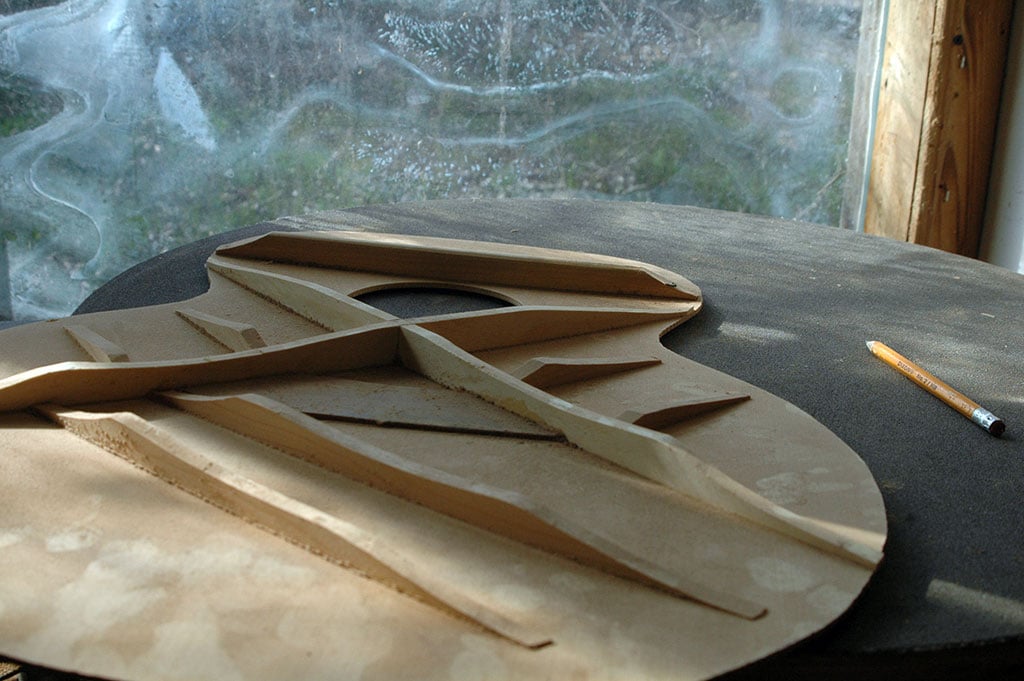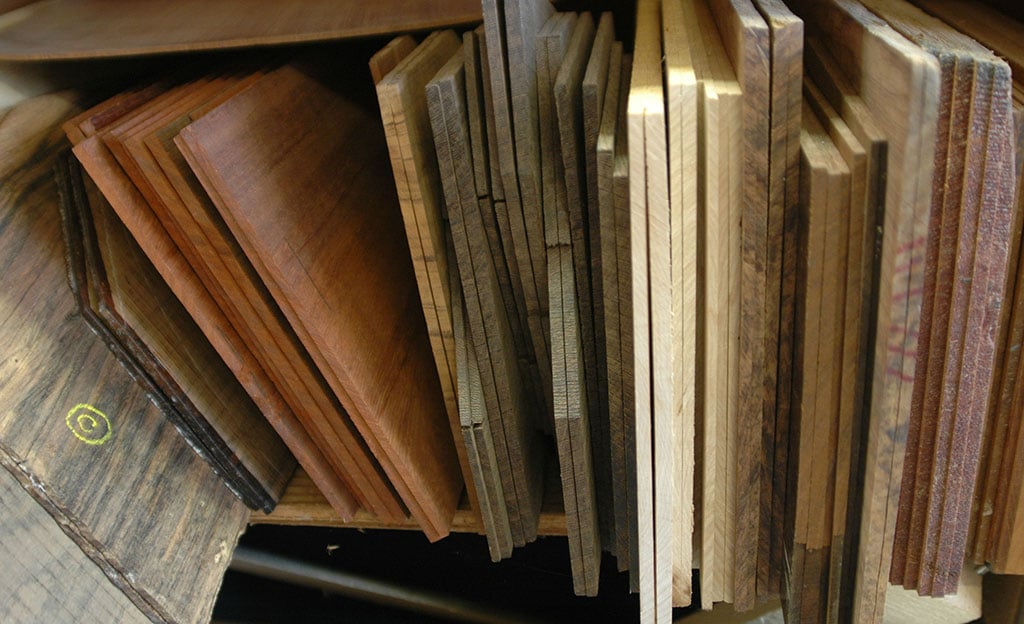
Fayetteville resident Bayard Blain has been making custom stringed instruments for more than a decade. He has completed more than 200 instruments in that time.
Photo: Kevin Kinder
An introductory lesson in making guitars from Bayard Blain comes with a simultaneous short course on wood types. Perhaps this is to be expected from a carpenter at heart. There is a reverence in the way Blain flips a flat board and runs his hands over the marbling in pieces of Brazilian rosewood, American spruce or exotic mahogany. Wood surrounds everything in his Fayetteville studio, where he custom makes guitars for both local clients and a growing roster of national clients, too. Noted bluegrass musician Peter Rowan, for instance, has been spotted playing the one he bought last summer at the Fayetteville Roots Festival.
There is a sameness to the mass-produced guitars made in large factories. Blain works in the opposite mindset. When someone orders a guitar (or mandolin or ukulele, as he makes those, too) from him, he wants to watch that musician play before he starts the building process. He wants to watch the way they strike the guitar and hear the kind of music they make. A more traditional-sounding guitar might be in order, or he might make one sound a little brighter and crisper if that’s the preferred sound of the player. The ability to pair a player and instrument perfectly are skills he’s still refining, now more than a decade into the instrument-making business and after finishing at least 200 instruments.
Blain came to Fayetteville in 2003 after getting an offer to play in the bluegrass band Wildwood. He had just finished luthier – that’s the art of making stringed instruments – training at the Summit School of Guitar Building and Repair in British Columbia, and the prospect of starting a successful business in his hometown of Gardner, Montana, population 800, seemed slim. Wildwood had a flash of success then faded away. He eventually joined the bluegrass quartet 3 Penny Acre, a project with Bernice Hembree, Bryan Hembree and Shannon Wurst. Wurst continues making music as a solo artist and teacher. The Hembrees formed Americana act Smokey & The Mirror and also founded the Fayetteville Roots Festival. Blain left 3 Penny Acre to focus on his family and his instrument business.

Blain works with a musician to determine their playing style and genre to make a guitar that best suits their needs.
Kevin Kinder
Bayard Guitars operates simply, with low overhead. The business model relies on hours of detailed labor from Blain, who assembles the instruments piece by piece. A hard wood such as a rosewood is selected for the back panel. Then, a softer wood is chosen for the front panel, with a third piece of wood being picked for the fretboard. Much deliberation goes into the selection of the pieces of wood, as both appearance and tonal qualities must be considered. Blain collects chunks of wood, many of them rare or unique, for future use. He’s working with his first piece of the highly sought after Brazilian rosewood right now, and he also has enough wood to make a back panel from a tree so famous it has been profiled at length in magazines. Because of the difficulty in acquiring choice material, he buys it as he can and hopes he finds a client that matches later. The pursuit is such that he once left a note on the door of a wood source’s house after the man died in the hope the family might contact him if they sold off his inventory. No one called.
After the wood is selected, Blain starts the assembly process, which includes bracing the panels and placing the side panels into a form. There’s plenty of glue involved, too. Some makers use a scientific formula for the construction. Some are more intuitive, and Blain falls on the latter side of that balance. The process means no two instruments are the same. Two guitars of the same size, made from wood milled from the same tree, would produce two instruments with unique sound properties. But the pieces all share a common purpose and central design element.
“All instruments are different versions of a speaker cone,” Blain says.

The carved wood products are built to last.
Kevin Kinder
After a rigorous test for sound quality, Blain completes his instruments with decorating. The finishing process of shellacking and/or carving can take as long as primary assembly, Blain says. He hand carves his instruments and takes care match them with the colors he sees his clients wearing or the mood they exude when they meet to discuss the instrument. Again, uniqueness is key.
“Some builders have one guitar they make over and over. I’d get bored building the same guitar,” Blain says.
Hembree, a longtime friend and a former bandmate, pauses before saying why he thinks Bayard Guitars are so good. He’s worried he’ll sound too silly, too whimsical or mythical. But he says it anyway. There’s a magic in the way that Blain makes an instrument that connects with the person who finds it. He watched Blain develop as a luthier. Hembree saw him early in the process – maybe the 10th or 12th instrument Blain ever made – and had played many of the ones built in the years since. He saw the business and craftsmanship grow. And then?
“I saw him make 100 guitars before this one grabbed me,” Hembree said. And it wouldn’t let go.
Hembree started playing the guitar during his band’s involvement in the musical “Sundown Town” at TheatreSquared. When the production concluded, Hembree wasn’t ready to part with the instrument.
“‘Man, I can’t give this guitar back to you,’” Hembree told him. And so he kept it. He’s since added to the collection, and the Hembree family now also owns a Bayard bouzouki, ukulele and a second guitar.

Blain is equal parts craftsman and wood collector. He looks for pieces that have color, durability and strength.
Kevin Kinder
“I love guitars. But I don’t own four by any other maker,” Hembree said. Part of that is the friendship, sure. The other part is because Blain makes some of the best guitars and there’s “that kind of magical matching he can do.”
Blain put much of his luthier business on hold while he built – by hand, of course – a 1,000-square-foot addition to his home. But with that project nearing completing, he’s anxious to get back into his shop and start building instruments again. The backlog that built during his brief hiatus means that he currently has about a one-year turnaround time on commissions.
He is one of a limited number of boutique luthiers in the country. There is at least one other Arkansas-based maker. But Blain’s trade is a rarity, especially when operated at such a small scale. His shop isn’t yet nationally known, even if his reputation as a builder is widening. He’s working to break into the national market, and guitars sold to players like Rowan might be the key. He knows one mandolin or guitar in the hands of the right person might be a big break.
“People don’t want to buy a random guitar. But they want to support the craft,” he says.
Meanwhile, he also knows his instruments hold up against any handcrafted instruments made elsewhere in this country.
“I don’t feel like I build duds anymore,” he said. “The line between a good instrument and a great one is thin.”
And the line to get one of his guitars appears to be lengthening.




